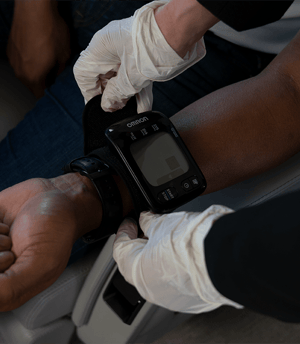
Case Study | Diversion Due to Unconfirmed Chest Pain
An avoidable diversion underscores the importance of diagnostic capabilities onboard.
Medical incidents in flight are a known operational risk, particularly on long-haul routes and high-profile business aviation journeys. While most in-flight events do not result in diversions, the inability to rule out severe conditions in real-time often leaves the pilot and clinical teams with no safe alternative but to divert.
In this case, a Gulfstream G650 operating a long-haul route was forced to divert after a passenger experienced chest pain. The symptoms mimicked a heart attack, but without diagnostic capability onboard, the crew and MedAire’s MedLink team were left with incomplete clinical information.
THE CASE
Midway through the flight, a senior executive passenger onboard the G650 reported chest tightness, shortness of breath, and radiating discomfort to the left shoulder — hallmark symptoms of a possible cardiac event.
Following protocol, the crew contacted MedAire’s MedLink and provided detailed symptom descriptions. However, the aircraft was not equipped with an ECG-capable device, preventing the MedLink physician from confirming or ruling out a serious cardiac condition.
With limited data and the patient’s symptoms persisting, the MedLink physician, in collaboration with the pilot in command, decided to divert to the nearest suitable medical facility.

CHALLENGES
-
Lack of Advanced Diagnostic Equipment: Without an ECG or Digital Assessment Kit, MedLink could not confidently differentiate between a heart attack and a non-critical condition.
-
Operational Disruption: Diversion of a G650 introduced delays, duty limitations, and logistics challenges for a multi-passenger itinerary.
-
Financial Impact: The diversion resulted in unplanned costs, including landing fees, parking, medical care, and extended ground time.
-
Passenger Anxiety: The uncertainty of the medical situation elevated stress levels for all onboard.
MEDAIRE'S SUPPORT
From the moment the call was placed to MedLink, the strength of MedAire360’s integrated medical and operational support worked in concert to manage the situation with precision and professionalism.
As the cabin crew relayed the passenger’s symptoms, the MedLink physician provided real-time clinical triage, carefully assessing the likelihood of a cardiac event. Without access to in-flight ECG data, the symptoms could not be confidently ruled non-serious. Based on the presentation and in line with best-practice protocols, the physician recommended a diversion to ensure the passenger could be fully evaluated on the ground.
At the same time, the flight crew followed in-flight medical procedures, accessing the Advanced Aviation Medical Kit under MedLink’s guidance. The passenger received oxygen and was continuously monitored during descent, with the crew leveraging the available tools and training.
Given the destination, an Airport Risk Assessment validated the location as viable with the medical infrastructure needed to support a safe diversion for the patient and the crew.
As the aircraft approached the diversion location, coordination shifted to MedAire’s Global Response Center, which managed the ground-side response. The team:
- Pre-alerted the receiving cardiac hospital and shared clinical information in advance
- Arranged ambulance transport directly to the hospital from the aircraft
- Issued a guarantee of payment to ensure there were no delays or barriers to care
Meanwhile, the crew applied their MedAire Management of In-flight Illness & Injury Training, staying calm, vigilant, and communicative, ensuring MedLink had continuous updates and that the passengers remained stable throughout the event.
This coordinated, multidisciplinary response exemplifies how MedAire360 works as a cohesive system to support complex, high-stakes inflight events, enabling operators to make confident, informed decisions, even in the most remote locations.
SUCCESSFUL OPERATION
Upon arrival, the passenger was transported directly from the aircraft to a nearby cardiac hospital. A complete evaluation was performed, and the results ruled out a heart attack. The final diagnosis pointed to non-cardiac chest pain, likely caused by gastrointestinal irritation or anxiety, a condition that, while distressing, was not medically urgent.
The flight crew executed the situation professionally and soundly, making the right call based on available tools. The health and safety of the passenger remained the top priority throughout the incident.
That said, the decision to divert, while medically and operationally appropriate, came with a significant downstream impact:
- The aircraft was grounded for over 12 hours while the passenger received care and the crew reached duty time limits.
- Other passengers were delayed, and alternative arrangements had to be considered.
- The operator absorbed unexpected landing, parking, ground handling, and medical costs.
This case underscores an essential evolution in in-flight medical capability: today’s tools allow for greater certainty, even in remote or high-consequence environments. With a Digital Assessment Kit onboard, the crew could have captured and transmitted ECG and vital sign data to the MedLink physician in real-time. With that insight, the clinical team could likely have ruled out a serious cardiac event, providing the confidence to continue the flight without diversion.
For operators who already invest in safety, training, and expert in-flight care, tools like the Digital Assessment Kit offer medical insight and add peace of mind for the crew, passengers, and decision-makers alike.
